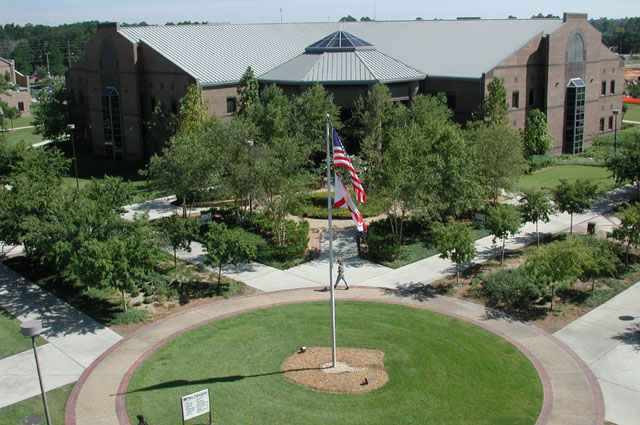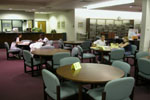SNS - Social Networking Services - Use Caution on the Internet !
Probably half the 70 computers here in the TCC Library set up for student use are either in FaceBook or MySpace at any given moment, while a few other students might be browsing in LiveJournal, Xanga, Friendster, Tribe, Bebo, Linkedin, Match, BlackPlanet, Orkut or any of the other 300 similar sites.
ALL these sites are considered SNS - social networking services, where participants can share photos and information with family and friends, and find new friends of similar interests.
Sounds like fun ? Over 70 million users have posted to one or more of those sites -
figures compiled in November show 70 million for MySpace, 11 million for FaceBook, 9 million for LiveJournal, 8 million for Xanga - (1).
MySpace had logged 23 billion page views in February, making it the 2nd busiest website after Yahoo, beating Ebay and MSN, 3 times the page views of Google ! (2 & 3)
So what’s the problem ? The answer is multifaceted.
- Postings can be viewed by potential employers, college admission offices, law enforcement officers, selection committees, virtually anyone - all of which means the information you post can be used against you, overtly or covertly, even if you exaggerated or falsified that information. Posting pictures showing yourself in x-rated acts - not a good idea.
- Posting pictures showing illegal activities [under-age drinking, smoking marijuana] can get you expelled from school.
- Teachers can catch students in lies ! ex: I had a death in the family, but the SNS says you were partying all night and got hammered
- Identity thieves can gather your information to impersonate you - TMI.
- You could become a victim of Cyberbullying* (note below)
- You could be guilty of cyberbullying and subject to harrasment charges
- Worse -
Information you posted can be viewed by cyberspace predators making you a target.
Who’s posting the caution flags ?
religious organizations, college campuses, national and international news media
Keeping students cybersafe: educating students about online dangers is a security issue not to be forgotten.
University Business, Jan 2006 by Jean Marie Angelo
College freshman Taylor Behl was killed by a cyberpredator. Suggestions for school administrators on informing students of safe cyber-use.
Brigham Young University: Bishops Warn Against Facebook, MySpace
"recently, several BYU bishoprics have cautioned their wards against the dangers of online social networks like Myspace and Facebook"
Wired News, Scenes from the MySpace Backlash
A highschool student’s posting got him suspended and became an ACLU lawsuit.
The Observer. Faculty, Staff at Notre Dame and Saint Mary’s view students’ profiles 3/29/2006
MySpace, Facebook attract online predators - Nightly News with Brian Williams
Experts say be careful what you post online — somebody is always watching MSNBC.com - http://www.msnbc.msn.com/id/11165576/
USA Today - Alarms sound over athletes’ Facebook time
relates how FSU and Kentucky told student athletes to clean up their pages, and how other colleges have dropped students from athletic programs because of their postings.
USA Today - What You Say Online Could Haunt You -
ContraCosta Times College officials ponder effects of FaceBook, MySpace. By Matt Krupnick, 3/27/2006
Employers Look At Facebook, Too. Companies Turn To Online Profiles To See What Applicants Are Really Like - as CBS News correspondent Sharyn Alfonsi reports, an increasing number of potential employers are accessing these profiles — and using them to decide whom they hire.
CBS Evening News, June 20, 2006
CyberBullying -
use of e-mail, blogs, IMs [instant messaging], chat rooms, websites, or other electronic devices, to harass, intimidate, torment, or threaten another person.
it’s mean-spirited, it’s growing exponentially, and the worst offenders may surprise you !
In July 2003, the Journal of the American Academy of Child and Adolescent Psychiatry published a report by Jerome & Segal, "Bullying by Internet". At the time of their writing, the authors indicated there were no reports in the professional literature concerning "Internet bullying", and a Google search at that time "yielded 32 references" (42).
A Google search earlier today found 7,250,000 for internet bullying . . .
a database search in Omnifile found 99 article citations, in Academic Search found 121 article citations -
CyberBullying - Adults are victims too
StayingSafeOnline@groups.com
What every parent needs to know about cyberbullying
by Rachel Simmons, author of Odd Girl Out
on CBS When Girls are Bullies
USAToday.com Schoolyard bullies get nastier online
by Jon Swartz, 3/6/2005
Dealing with Cyberbullies. Cyber Security Tip
US Computer Emgergence Readiness Team
CBS News Schools Grapple With Student Blogging The worries range from the serious — student safety and cyberbullying — to the mundane, minimizing gossip and protecting students from embarrassment.
Feb 2, 2006
MSNBC Bully Alert: How to Bash this senseless behavior
Oct 12, 2005. Dr. Ruth Peters
About FaceBook.com
About myspace.com
1 - Latest SNS Numbers - from Wharton, Univ Penn.
2 - SNS comparison numbers - from Business Week "users crowd into MySpace"
3 - SNS grow 47 % - Nielsen net ratings
This posting is a repair/replacement to the original posted on 4/19 - I tried to change a typo, then moved a url, only to have a minor modification self-destruct taking about 1/2 of the original post with it and I could't seem to get the original back intact - so, if you are a returning visitor and things are different, I've learned that it would be useful for me to keep a copy in a .txt file somewhere, just in case I have another bad typing day !



